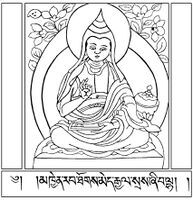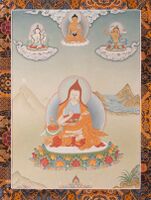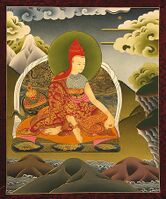Śāntideva: Difference between revisions
No edit summary |
No edit summary |
||
| (16 intermediate revisions by 3 users not shown) | |||
| Line 1: | Line 1: | ||
{{Person | {{Person | ||
| | |MainNamePhon=Śāntideva | ||
| | |SortName=Shantideva | ||
|MainNameTib=ཞི་བ་ལྷ། | |||
|MainNameWylie=zhi ba lha | |||
|PersonType=Classical Indian Authors | |PersonType=Classical Indian Authors | ||
|images=File:Shantideva (tsagli).jpg | |bio=Śāntideva (late 7th to mid-8th century CE) was a Buddhist monk, philosopher, and poet whose reflections on the overall structure of Buddhist moral commitments reach a level of generality and theoretical power that is hard to find elsewhere in Indian thought. His writings were immensely influential in the development of the Tibetan religious tradition. Though Śāntideva repeatedly denied that he had said anything original, his two major works may nevertheless represent the single most significant contribution of the Buddhist tradition to the global enterprise of ethical theory. And some of Śāntideva’s poetic passages exhibit an emotional and rhetorical power that gives them a claim to be included among the greatest achievements of world literature. (Source: [https://plato.stanford.edu/entries/shantideva/ The Stanford Encyclopedia of Philosophy]) | ||
|images=File:Shantideva high res brighter cropped.jpg | |||
File:Shantideva high res brighter.jpg | |||
File:Shantideva Tsemrinpoche.jpg | |||
File:Shantideva rising.jpg | |||
File:Shantideva (floating).jpg | |||
File:Shantideva (tsagli).jpg | |||
File:Shantideva (line drawing).jpg | File:Shantideva (line drawing).jpg | ||
File:Shantideva (Sahil Phopal).jpg | |||
File:Shantideva (floating with text).jpg | |||
File:Shantideva (seated).jpg | |||
File:Bu su ku.jpg{{!}} [https://anthro.amnh.org/anthropology/databases/common/image_dup.cfm?catno=70%2E2%2F%203486%20AA&curr_page=&from_anthro=no American Museum of Natural History] | |||
File:Manjushri-Shantideva-Patrul-Rinpoche-scaled.jpeg | |||
|YearBirth=late 7th century | |YearBirth=late 7th century | ||
|YearDeath=mid 8th century | |YearDeath=mid 8th century | ||
| Line 14: | Line 23: | ||
|BdrcLink=https://www.tbrc.org/#!rid=P6161 | |BdrcLink=https://www.tbrc.org/#!rid=P6161 | ||
|BdrcPnum=6161 | |BdrcPnum=6161 | ||
|HasDrlPage=Yes | |||
|HasLibPage=Yes | |||
|MainNameDev=शान्तिदेव | |||
|AltNamesWylie=rgyal sras zhi ba lha; Bhusuku | |||
|AltNamesTib=རྒྱལ་སྲས་ཞི་བ་ལྷ་; བྷུ་སུ་ཀུ་ | |||
|BuNayDefProvComplex=No | |||
|BuNayWheelTurnComplex=No | |||
|BuNayYogaMadhyaComplex=No | |||
|BuNayZhenRangComplex=No | |||
|BuNayVehiclesComplex=No | |||
|BuNayAnalyticMeditComplex=No | |||
|BuNayEmptyLuminComplex=No | |||
|IsInGyatsa=No | |IsInGyatsa=No | ||
|pagename=Śāntideva | |||
|classification=Person | |classification=Person | ||
}} | }} | ||
<noinclude>[[Category:Indian authors sanskrit names]]</noinclude> | |||
Latest revision as of 05:07, 4 February 2026
| PersonType | Category:Classical Indian Authors |
|---|---|
| MainNamePhon | Śāntideva |
| MainNameTib | ཞི་བ་ལྷ། |
| MainNameWylie | zhi ba lha |
| MainNameDev | शान्तिदेव |
| SortName | Shantideva |
| AltNamesTib | རྒྱལ་སྲས་ཞི་བ་ལྷ་ · བྷུ་སུ་ཀུ་ |
| AltNamesWylie | rgyal sras zhi ba lha · Bhusuku |
| bio | Śāntideva (late 7th to mid-8th century CE) was a Buddhist monk, philosopher, and poet whose reflections on the overall structure of Buddhist moral commitments reach a level of generality and theoretical power that is hard to find elsewhere in Indian thought. His writings were immensely influential in the development of the Tibetan religious tradition. Though Śāntideva repeatedly denied that he had said anything original, his two major works may nevertheless represent the single most significant contribution of the Buddhist tradition to the global enterprise of ethical theory. And some of Śāntideva’s poetic passages exhibit an emotional and rhetorical power that gives them a claim to be included among the greatest achievements of world literature. (Source: The Stanford Encyclopedia of Philosophy) |
| YearBirth | late 7th century |
| YearDeath | mid 8th century |
| BornIn | India |
| BDRC | https://www.tbrc.org/#!rid=P6161 |
| IsInGyatsa | No |
| Other wikis |
If the page does not yet exist on the remote wiki, you can paste the tag |












